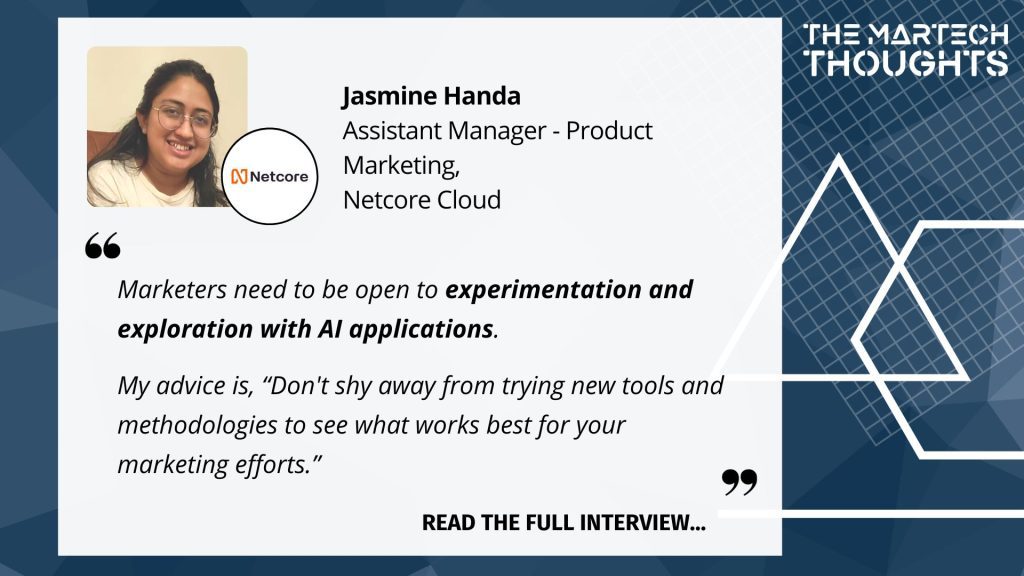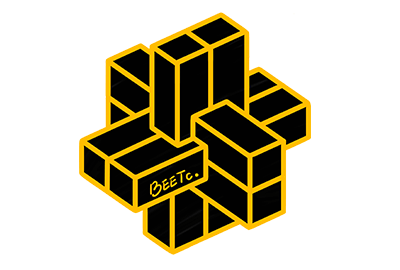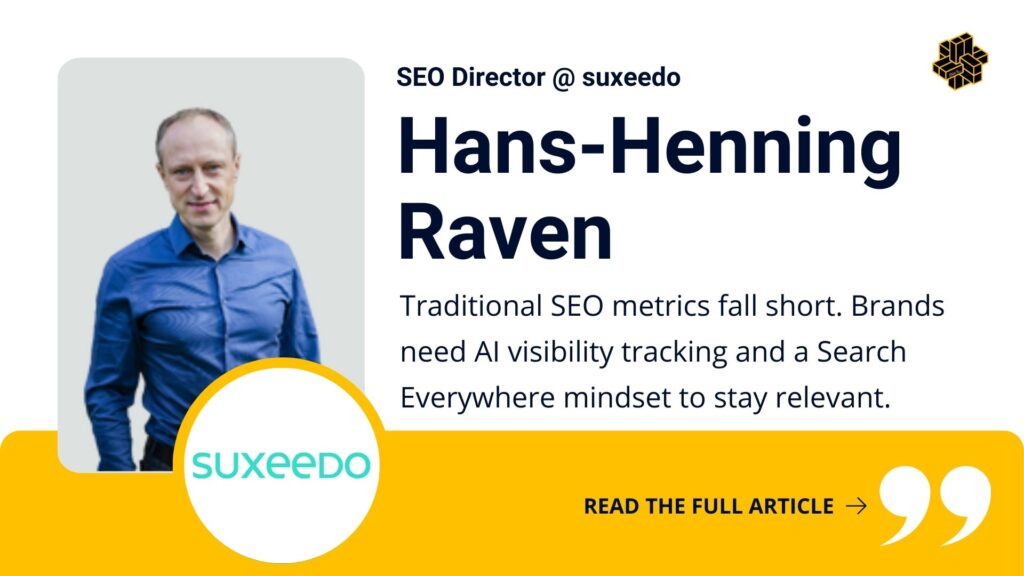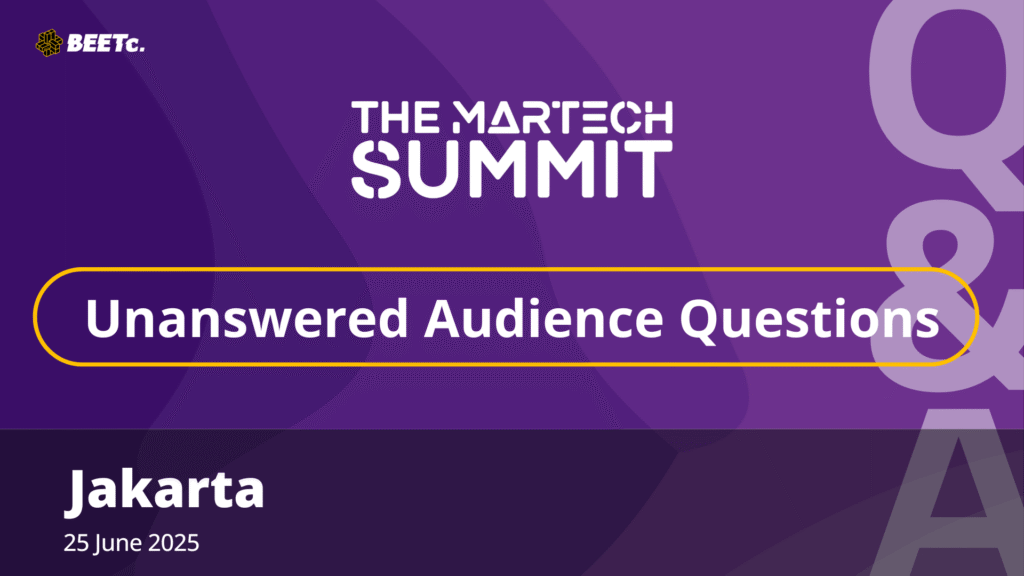
Welcome Jasmine Handa, Assistant Manager – Product Marketing, Netcore Cloud, sharing her insights on Google Analytics, MarTech Stacks & Marketing Skillsets, as part of the MarTech Thoughts series.
What is your industry? And how would you explain your job to a 5-year-old?
I have been working in the MarTech Industry. MarTech brings together different channels of communication such as email, SMS, WhatsApp, app and web push notifications, podcasts, webinars and social media engagement.
Little kids gain knowledge through different ways such as reading picture books, listening to rhymes, watching a video, talking to friends and family members etc. Similarly, MarTech is a technology that uses different forms of communication to talk about different products with grown-ups. I lead a team of people who create and distribute such communications in an interesting manner.
What is the one marketing platform/app/solution you can’t live without? Why?
One marketing platform that I consider indispensable is Google Analytics. It’s a free web analytics service offered by Google. It provides a comprehensive range of insights into website traffic and user behaviour.
Here’s why Google Analytics is highly regarded:
- Data-driven Decision Making: Google Analytics offers a wealth of data on website visitors, including where they come from, what they do on the site, and which pages they visit the most. This data helps me to make informed decisions and optimise my lead-generation strategies.
- Audience Understanding: The platform provides detailed demographic and interest data about the website’s audience. This enables me to better understand and target their key demographics through various collaterals.
- Goal Tracking: Google Analytics allows setting up and tracking specific goals, such as conversions, form submissions, or purchases. This feature helps me to measure the success of marketing campaigns and identify areas for improvement.
- Acquisition Insights: It provides insights into which marketing channels drive the most traffic to the website, such as organic search, social media, or paid advertising. This data helps to allocate marketing budgets effectively.
- Integration with Other Tools: It seamlessly integrates with other Google marketing tools, such as Google Ads and Google Search Console, enabling a more holistic view of marketing performance.
- Customisation: I can create custom reports and dashboards tailored to my specific needs, making it easier to track the metrics that matter the most for my team.
Overall, Google Analytics empowers actionable data and insights, enabling me to optimise strategies, improve user experiences, and drive better results.
Currently, what are you primarily looking for in your digital marketing efforts? Awareness or engagement? Why?
I am primarily looking for engagement.
There are more than 1 trillion digital interactions happening through Netcore’s platform in a year. At this stage, we want to foster deeper connections and build brand loyalty. This will lead to higher customer retention and advocacy in the long run.
We are also focusing on initiatives that drive customer marketing. This will help us in repeat business, upselling and cross-selling opportunities and building a community.
What are some of the significant changes to your customer outreach and retention strategies? And how has it impacted the growth plan for upcoming years?
For customer outreach, we are using interactive elements like quizzes, polls, and interactive videos to engage and capture user attention. We are also focusing on collaborating with complementary businesses for joint promotions and cross-promote each other’s products.
For customer retention, we are focusing on building a community. This helps in connecting, sharing experiences, and providing support and advice. We focus a lot on innovation and adaptability. This is not a change but a continuous activity for us. We are also engaging our customers through webinars and events. It is a great networking opportunity, building personal reputation and companionship.
The impact that it has created on the growth plan:
- Networking in webinar and events have resulted in longer-lasting relationships with customers, leading to higher Customer Lifetime Value.
- A strong foundation of engaged and loyal customers allows for more confident expansion into new markets. Partnerships have helped to expand our product offerings as well.
- Satisfied customers become brand advocates, contributing positively to brand reputation and credibility.
Overall, our customer outreach and retention strategies are helping to increase revenue due to the cumulative effects of higher retention rates, increased Customer Lifetime Value, and customer referrals.
How do you see the skillsets needed for the marketing profession changing?
With AI being used predominantly in all marketing activities, marketing professionals need to evolve and upgrade their skillsets to leverage AI.
- I suggest staying updated with the latest advancements in AI and machine learning technologies. Marketers can take online courses, attend workshops, webinars, and industry conferences to gain insights into AI applications in marketing.
- They should familiarise themselves with AI-powered marketing tools and platforms. And experiment with AI-driven analytics, content generators, and other AI-based solutions. This will help them to understand their functionalities and potential benefits.
- They should also understand the ethical implications of using AI in marketing, particularly in data privacy and security. They should ensure compliance with relevant regulations and prioritise customer data protection.
- They should leverage AI to segment customers and personalise marketing messages. And develop strategies to provide hyper-targeted content and offers.
- They should learn to integrate AI-powered chatbots and voice assistants into customer service and marketing communication. By designing chatbot scripts, they can help to provide valuable assistance and enhance user experiences.
- They should use predictive analytics to forecast customer behaviour, optimise marketing campaigns, and identify potential opportunities.
- They can also explore AI-generated content and assess its value for specific marketing objectives. Combining AI-generated content with human creativity can help craft engaging and relevant messaging.
In the end, marketers need to be open to experimentation and exploration with AI applications. My advice is, “Don’t shy away from trying new tools and methodologies to see what works best for your marketing efforts.”
How do you keep your team motivated to get the best out of them during challenging economic times with additional external pressure?
First of all, maintaining a positive and optimistic outlook is very important. I try to keep myself enthusiastic to uplift the team’s spirits.
Always have transparent communication to keep the team informed about the company’s situation and the challenges it is facing. It builds trust and helps everyone understand the bigger picture.
I clearly define short-term and achievable goals for the team. Break down larger objectives into smaller milestones, providing a sense of progress and accomplishment.
I acknowledge individual and team achievements by sending a ‘thank you’ email, even the small ones. Celebrating successes, no matter how minor, boosts morale and creates a positive work environment.
I encourage collaboration and support among team members. Building a strong sense of camaraderie helps everyone face challenges together.
Above all, I try to be a role model for the behaviour and attitude I want to see in my team. Demonstrating resilience and a positive mindset encourages the team to follow suit. After all, you really cannot preach that you do not practice.
How do you monitor the effectiveness of your audience segmentation?
We, as a team, regularly monitor various metrics and data points to gain valuable insights into the effectiveness of our audience segmentation.
The first is the engagement metrics, such as click-through rates, open rates, and time spent on website pages, for each audience segment. We then compare the performance of different segments to assess their effectiveness.
We analyse the conversion rates for each segment, measuring how well each group responds to calls-to-action and completes desired actions (e.g., making a purchase, signing up for a newsletter).
We also gather feedback from customers in each segment through surveys, feedback forms, or interviews. Understanding their preferences, pain points, and satisfaction levels helps to refine our segmentation approach. AMP for emails have been really helpful in collecting the data in an easy way.
We always try to leverage data from your Customer Relationship Management (CRM) system to gain insights into each segment’s purchase history, support interactions, and overall customer journey.
Over and above, we assess the ROI of marketing efforts aimed at specific segments. Although the attribution becomes a bit difficult. However, with whatever data we have acquired, we compare the cost of acquisition and customer retention for each group.
This information allows for continuous optimisation and improvement of marketing strategies implemented for different customer groups.
A big thank you to Jasmine Handa from Netcore Cloud, sharing her insights on Google Analytics, MarTech Stacks & Marketing Skillsets.
If you want to connect with Jasmine after reading her MarTech Thoughts, please reach out to her via her LinkedIn Profile!
See more MarTech Thoughts interview posts here: https://themartechsummit.com/category/martech-thoughts/
Last updated: Sep 2023













